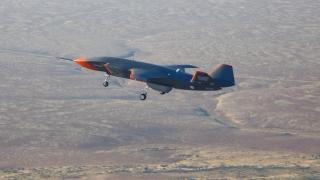Australia’s advances in artificial intelligence (AI) and quantum technologies will have greater impact in the near future than new submarines under the AUKUS partnership, according to new research by the United States Studies Centre (USSC).
Laying the foundations for AUKUS: Strengthening Australia’s high-tech ecosystem in support of advanced capabilities reveals AUKUS presents Australia with a once-in-a-generation opportunity to bolster its science, technology, and defence industry ecosystems. In doing so, Australia can cement itself as a valuable contributor to an integrated trilateral AUKUS defence industrial base.
Report author and USSC Foreign Policy and Defence Non-Resident Fellow, Jennifer Jackett, said Australia has advantages to build on like research leadership in quantum physics, a skilled workforce, and a stable economy for investment.
“Capabilities arising from technological developments in quantum, cyber, AI, undersea, hypersonics, and electronic warfare will be more consequential strategically and sooner than the arrival of nuclear-powered submarines,” Ms Jackett said.
“Technological advancement in one area will also have flow-on effects for other advanced capabilities.
“For example, as quantum computing becomes more powerful, it is expected to improve AI through the training of machine-learning models which could strengthen intelligence analysis and logistics management,” she elaborated.
However, to realise the opportunities that AUKUS presents, Ms Jackett said Australia must urgently grapple with critical challenges. These include flatlining research and development funding, poor commercialisation rates, limited integration of government, industry and academia, and a skills shortage.
“Even if Australia’s shortcomings are addressed, it cannot be a leader in all high-tech areas and the government needs to be realistic about these limitations and prioritise its investments,” Ms Jackett said.
“AUKUS is also premised on the idea that each partner can play to their strengths and draw on each other’s capability and capacity to address gaps or vulnerabilities”.
She concluded, “Maintaining a leading edge in advanced capabilities will be a decisive factor for Australia and its AUKUS partners to better defend against a technologically sophisticated adversary in a more hostile Indo-Pacific.”
Key policy recommendations:
- Deepen Australia’s understanding of areas of comparative advantage, complementarity, gaps and overlaps with the science, technology and defence industry ecosystems of the United States and the United Kingdom.
- Share lessons learned and best practice on models of defence innovation, including to support higher rates of commercialisation.
- Strengthen government, research, and industry collaboration through the establishment of secure high-tech research precincts.
- Build Australia’s talent pipeline through a high-tech super mobility program and a new ‘AUKUS visa’.
Media contact: Patrick Whiteley 0468 480 165





